shakespeare(sonnet) 英国文学 十四行诗
十四行诗 Sonnet 18
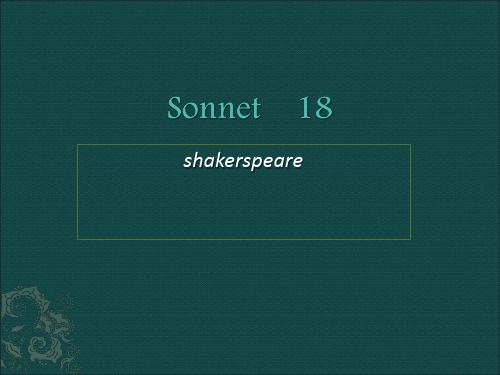
我能否将你比作夏天? 你比夏天更美丽温婉。 狂风将五月的蓓蕾凋残, 夏日的勾留何其短暂。 休恋那丽日当空, 转眼会云雾迷蒙。 休叹那百花飘零, 催折于无常的天命。 唯有你永恒的夏日常新, 你的美貌亦毫发无损。 死神也无缘将你幽禁, 你在我永恒的诗中长存。 只要世间尚有人吟诵我的诗篇, 这诗就将不朽,永葆你的芳颜。
shakerspeare
shakespeare: 威廉· 莎士比亚(William Shakespeare,1564-1616) 是欧洲文艺复兴时期英国最 重要的作家,杰出的戏剧家 和诗人,他创作了大量脍炙 人口的文学作品,在欧洲文 学史上占有特殊的地位,被 喻为“人类文学奥林匹克山 上的宙斯”。 他亦跟古希腊 三大悲剧家埃斯库罗斯 (Aeschylus)、索福克里斯 (Sophocles)及欧里庇得斯 (Euripides)合称戏剧史上四大 悲剧家
第一节(1-4) 起
第二节(5-8)承
第三节(9-12)转
第四节(13-14)合
ቤተ መጻሕፍቲ ባይዱ
十四行诗之十八以问句开篇,“我可将你比作夏天?”(shall I compare thee to a summer’s day ?)将使人比作英国气候最宜人的夏季, 通俗自然,让人耳目一新。然后再自答“你比夏天更可爱,也更温 婉。”诗人对朋友的珍爱之情跃然纸上,原因在于:狂风会把五月娇 嫩的花蕾摧残,夏天延迟的时间又过于短暂。这二句胃下面铺垫。以 上四句是诗的第一节,此为起。 诗人接着解释道,天上的眼睛有时发出灼热的亮光,他金色的容颜又 遭到乌云遮挡;无论是偶然原因或者是必然的变化,一切美好的事物 总会凋零,此为承。
在第三节,诗人从天道变化,时光的易逝的感叹转向对朋友青春和美 貌的直接赞颂。“可是啊,你永恒的夏天不会消逝,你娇美的容颜啊, 永远不会年老色衰,就连死神也无法夸口你在她的阴影里徘徊,你会 在不朽的诗行里与时间同在。”此为转。诗人赞颂朋友的青春美貌闭 夏天,比时间更能持久而永恒。
莎士比亚十四行诗简介

莎士比亚十四行诗简介一、莎士比亚十四行诗的背景概述莎士比亚(William Shakespeare)是英国文艺复兴时期最重要的戏剧作家之一,他以其深邃的思想和丰富多样的作品而闻名于世。
莎士比亚的作品跨越了戏剧、诗歌和散文,而他的十四行诗则是他众多作品中的一颗璀璨之星。
二、莎士比亚十四行诗的特点莎士比亚的十四行诗是以英语诗歌中最常见的格式之一——抒情诗(Sonnet)的形式创作而成。
一首完整的十四行诗由14个诗行组成,按一定的韵律和押韵规则编排。
莎士比亚的十四行诗特点主要体现在以下几个方面:1. 韵律和押韵规则莎士比亚的十四行诗是按照特定的韵律和押韵规则编写的。
每个诗行包含10个音节,通常被称为“五音步(pentameter)”。
而整首诗的押韵规则则是“ABABCDCDEFEFGG”。
这种规则的押韵方式增加了诗歌的韵律感,使诗歌更加优美动人。
2. 内容和主题莎士比亚的十四行诗内容多样,主题涵盖了爱情、时间、死亡、自然等多个方面。
他以细腻的情感和深刻的思考,表现了人类的喜怒哀乐,揭示了人性的复杂性和命运的无常。
他的十四行诗既有对美好事物的赞美,也有对世俗现实的讽刺和嘲笑。
3. 诗歌结构和语言运用莎士比亚的十四行诗通常分为四个部分:第一部分是前八行,称为“抒情部分(the octave)”,主要表达诗人的疑问、思索或者赞美;第二部分是后六行,称为“总结部分(the sestet)”,用来回答前八行所提出的问题或做出总结性的陈述。
此外,莎士比亚的诗歌运用了丰富的修辞手法,包括比喻、拟人、夸张等,使诗歌显得生动有趣,能够吸引读者的注意力。
三、莎士比亚十四行诗的代表作品莎士比亚的十四行诗中,有几首作品被认为是他最杰出的代表作。
以下是其中几首代表作的简要介绍:1. 《两个城堡之战》这首诗是莎士比亚最著名的十四行诗之一,描述了两个城堡之间的战斗。
诗中抒发了作者对战争的憎恶以及对和平的向往。
2. 《时间的折磨》这首诗通过描绘时间对人的摧残和无情,表达了作者对时间流逝的焦虑和无奈。
莎士比亚154首十四行诗
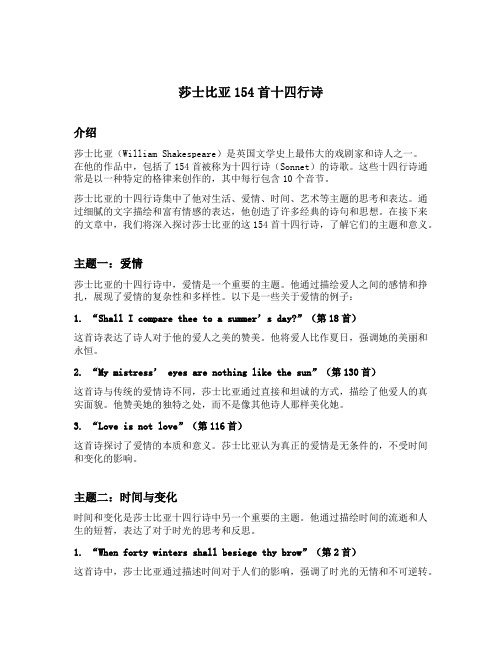
莎士比亚154首十四行诗介绍莎士比亚(William Shakespeare)是英国文学史上最伟大的戏剧家和诗人之一。
在他的作品中,包括了154首被称为十四行诗(Sonnet)的诗歌。
这些十四行诗通常是以一种特定的格律来创作的,其中每行包含10个音节。
莎士比亚的十四行诗集中了他对生活、爱情、时间、艺术等主题的思考和表达。
通过细腻的文字描绘和富有情感的表达,他创造了许多经典的诗句和思想。
在接下来的文章中,我们将深入探讨莎士比亚的这154首十四行诗,了解它们的主题和意义。
主题一:爱情莎士比亚的十四行诗中,爱情是一个重要的主题。
他通过描绘爱人之间的感情和挣扎,展现了爱情的复杂性和多样性。
以下是一些关于爱情的例子:1. “Shall I compare thee to a summer’s day?”(第18首)这首诗表达了诗人对于他的爱人之美的赞美。
他将爱人比作夏日,强调她的美丽和永恒。
2. “My mistress’ eyes are nothing like the sun”(第130首)这首诗与传统的爱情诗不同,莎士比亚通过直接和坦诚的方式,描绘了他爱人的真实面貌。
他赞美她的独特之处,而不是像其他诗人那样美化她。
3. “Love is not love”(第116首)这首诗探讨了爱情的本质和意义。
莎士比亚认为真正的爱情是无条件的,不受时间和变化的影响。
主题二:时间与变化时间和变化是莎士比亚十四行诗中另一个重要的主题。
他通过描绘时间的流逝和人生的短暂,表达了对于时光的思考和反思。
1. “When forty winters shall besiege thy brow”(第2首)这首诗中,莎士比亚通过描述时间对于人们的影响,强调了时光的无情和不可逆转。
2. “So sweet and lovely doth thy time make haste” (第60首)这首诗表达了莎士比亚对于时间的流逝的感叹。
莎士比亚sonnet106及其翻译
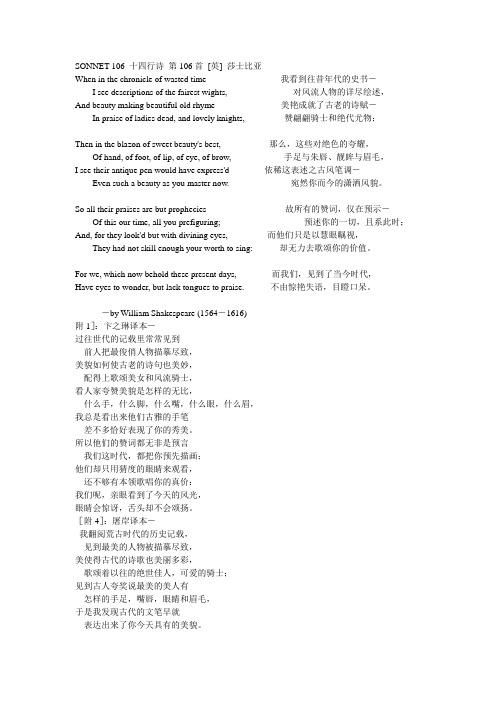
SONNET 106 十四行诗第106首[英] 莎士比亚When in the chronicle of wasted time 我看到往昔年代的史书-I see descriptions of the fairest wights, 对风流人物的详尽绘述,And beauty making beautiful old rhyme 美艳成就了古老的诗赋-In praise of ladies dead, and lovely knights, 赞翩翩骑士和绝代尤物;Then in the blazon of sweet beauty's best, 那么,这些对绝色的夸耀,Of hand, of foot, of lip, of eye, of brow, 手足与朱唇、靓眸与眉毛,I see their antique pen would have express'd 依稀这表述之古风笔调-Even such a beauty as you master now. 宛然你而今的潇洒风貌。
So all their praises are but prophecies 故所有的赞词,仅在预示-Of this our time, all you prefiguring; 预述你的一切,且系此时;And, for they look'd but with divining eyes, 而他们只是以慧眼瞩视,They had not skill enough your worth to sing: 却无力去歌颂你的价值。
For we, which now behold these present days, 而我们,见到了当今时代,Have eyes to wonder, but lack tongues to praise. 不由惊艳失语,目瞪口呆。
-by William Shakespeare (1564-1616)附1]:卞之琳译本-过往世代的记载里常常见到前人把最俊俏人物描摹尽致,美貌如何使古老的诗句也美妙,配得上歌颂美女和风流骑士,看人家夸赞美貌是怎样的无比,什么手,什么脚,什么嘴,什么眼,什么眉,我总是看出来他们古雅的手笔差不多恰好表现了你的秀美。
Sonnet18(屠岸)
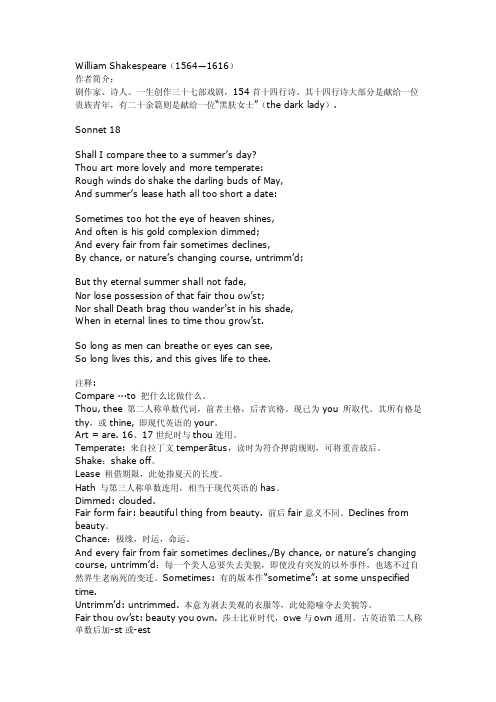
William Shakespeare(1564—1616)作者简介:剧作家、诗人。
一生创作三十七部戏剧,154首十四行诗。
其十四行诗大部分是献给一位贵族青年,有二十余篇则是献给一位“黑肤女士”(the dark lady).Sonnet 18Shall I compare thee to a summer’s day?Thou art more lovely and more temperate:Rough winds do shake the darling buds of May,A nd summer’s lease hath all too short a date:Sometimes too hot the eye of heaven shines,And often is his gold complexion dimmed;And every fair from fair sometimes declines,By chance, or nature’s changing course, untrimm’d;But thy eternal summer shall not fade,Nor lose possession of that fair thou ow’st;Nor shall Death brag thou wander’st in his shade,When in eternal lines to time thou grow’st.So long as men can breathe or eyes can see,So long lives this, and this gives life to thee.注释:Compare ···to 把什么比做什么。
Thou, thee 第二人称单数代词,前者主格,后者宾格。
现已为you 所取代。
英国十四行诗

英国十四行诗英国十四行诗是一种诗歌形式,源于意大利十四行诗(sonnet)的传统。
这种诗形最早在14世纪由意大利诗人彼得拉克创造,并在16世纪由英国诗人威廉·莎士比亚引入英国。
英国十四行诗通常由14行组成,分为四个四行节(四联)和一个两行节(双联)。
这个结构被称为“四联夫斯坦扎”(quatrains)和“双联夫斯坦扎”(couplet)。
每个四联夫斯坦扎的韵脚模式通常是押韵方式为ABAB,而双联夫斯坦扎的韵脚模式通常是CC。
这种结构使得英国十四行诗在形式上具有一定的规范性和统一性。
英国十四行诗的内容可以涵盖各种主题,包括爱情、自然、宗教、政治等。
莎士比亚的十四行诗被广泛认为是最具代表性的英国十四行诗之一。
他的十四行诗以其深刻的洞察力、感情的表达和优美的语言而闻名。
莎士比亚的十四行诗通常以爱情为主题,探讨了爱情的各个方面,包括欲望、失望、忠诚和不可避免的死亡。
除了莎士比亚,其他英国诗人也创作了许多优秀的十四行诗。
例如,约翰·米尔顿的诗集《失乐园》中包含了一些具有政治和宗教意义的十四行诗。
米尔顿的十四行诗以其复杂的结构和丰富的象征主义而著称。
另外,伊丽莎白时代的诗人埃德蒙·斯宾塞也以他的十四行诗集《仙后》而闻名。
斯宾塞的十四行诗以其浪漫的描写和富有想象力的语言而受到赞赏。
总而言之,英国十四行诗是一种形式严谨、内容丰富的诗歌形式。
它在英国文学史上占据着重要地位,被广泛认为是英国文学的经典之作。
无论是莎士比亚的爱情诗,还是米尔顿的政治诗,英国十四行诗都展示了诗人们对人类情感和人生意义的深刻思考。
莎士比亚十四行诗翻译和解读
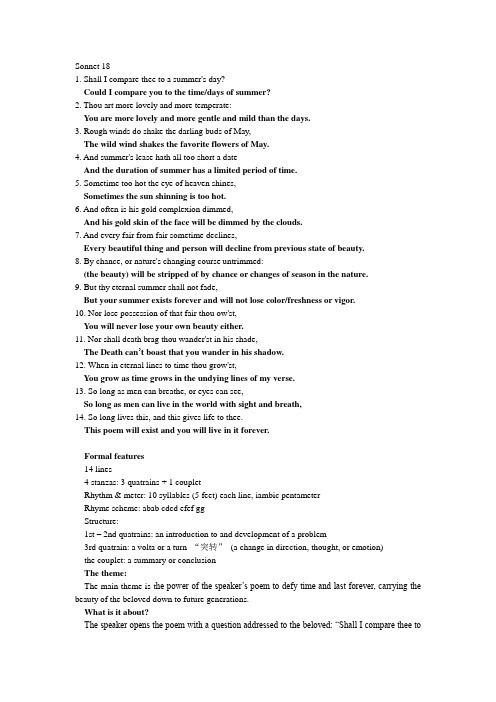
Sonnet 181. Shall I compare thee to a summer's day?Could I compare you to the time/days of summer?2. Thou art more lovely and more temperate:You are more lovely and more gentle and mild than the days.3. Rough winds do shake the darling buds of May,The wild wind shakes the favorite flowers of May.4. And summer's lease hath all too short a dateAnd the duration of summer has a limited period of time.5. Sometime too hot the eye of heaven shines,Sometimes the sun shinning is too hot.6. And often is his gold complexion dimmed,And his gold skin of the face will be dimmed by the clouds.7. And every fair from fair sometime declines,Every beautiful thing and person will decline from previous state of beauty.8. By chance, or nature's changing course untrimmed:(the beauty) will be stripped of by chance or changes of season in the nature.9. But thy eternal summer shall not fade,But your summer exists forever and will not lose color/freshness or vigor.10. Nor lose possession of that fair thou ow'st,You will never lose your own beauty either.11. Nor shall death brag thou wander'st in his shade,The Death can’t boast that you wander in his shadow.12. When in eternal lines to time thou grow'st,You grow as time grows in the undying lines of my verse.13. So long as men can breathe, or eyes can see,So long as men can live in the world with sight and breath,14. So long lives this, and this gives life to thee.This poem will exist and you will live in it forever.Formal features14 lines4 stanzas: 3 quatrains + 1 coupletRhythm & meter: 10 syllables (5 feet) each line, iambic pentameterRhyme scheme: abab cdcd efef ggStructure:1st – 2nd quatrains: an introduction to and development of a problem3rd quatrain: a volta or a turn “突转”(a change in direction, thought, or emotion)the couplet: a summary or conclusionThe theme:The main theme is t he power of the speaker’s poem to defy time and last forever, carrying the beauty of the beloved down to future generations.What is it about?The speaker opens the poem with a question addressed to the beloved: “Shall I compare thee toa summer’s day?” The next eleven lines are devoted to such a comparison. Summer: (Line 3: rough winds;4:too short;5. too hot;6. too dimmed;7&8. beautiful things will die) Sonnet 18 is the first poem in the sonnets not to explicitly encourage the young man to have children. The “procreation” sequence of the first 17 sonnets ended with the speaker’s realization that the young man might not need children to preserve his beauty; he could also live forever in this poem.Figures of speechIn line (5 ) There is a Metaphor .In line ( 5+6 ) There is a Personification .( eye of Heaven shines ) : Eye of heaven = the sunThe sun became dark because dark of clouds .In Line (9+10+12 ) There is a Hyperbole .In Line ( 11 )There is a personification .In Line ( 14 ) There is an Inverted order .Analysis: (拓展)The poem works at a rather curious level of achieving its objective through dispraise.The summer's day is found to be lacking in so many respects (too short, too hot, too rough, and sometimes too dingy), but curiously enough one is left with the abiding impression that 'the lovely boy' is in fact like a summer's day at its best, fair, warm, sunny, temperate, one of the darling buds of May, and that all his beauty has been wonderfully highlighted by the comparison.Sonnet 1301. My mistress' eyes are nothing like the sun;My lady’s eyes aren’t like the sun at all.2. Coral is far more red, than her lips red:Coral is much redder than her lips.3. If snow be white, why then her breasts are dun;If snow is white, then her breasts are brown.4. If hairs be wires, black wires grow on her head.If hair is as coarse as threads, then her hair is full of black threads.5. I have seen roses damasked, red and white,I have seen the pinkish, red and white roses.6. But no such roses see I in her cheeks;But I can see such kinds of roses in her cheeks.7. And in some perfumes is there more delightThere is much tempting/attractive fragrance.8. Than in the breath that from my mistress reeks.The fragrance is more attractive than her steamy, sweaty and unsavory smells.9. I love to hear her speak, yet well I knowI like listening to her speaking, but I am also aware that10. That music hath a far more pleasing sound:The sound of music is much more favorable than her sound.11. I grant I never saw a goddess go,I admit that I never saw a goddess walking by.12. My mistress, when she walks, treads on the ground:My mistress stamps on the floor when she walks.13. And yet by heaven, I think my love as rare,But I can swear to God that my lover is as precious as15. As any she belied with false compare.As any woman who has been misrepresented by ridiculous comparisons.Formal features14 lines4 stanzas: 3 quatrains + 1 coupletRhythm & meter: 10 syllables (5 feet) each line, iambic pentameterRhyme scheme: abab cdcd efef ggStructure:1st – 2nd quatrains: an introduction to and development of a problem3rd quatrain: a volta or a turn “突转”(a change in direction, thought, or emotion)the couplet: a summary or conclusionThemeThe poet suggests their love is rare because he does not desire her to be something she is not.It's about finding love in spite of (or maybe even because of) physical flaws.It pokes fun at our obsession with looks and to show how ridiculous it is to ask any person to live up to some ideal of perfect beauty.Figures of speechNegative similesSimile may also be expressed in the negative form“My mistress’ eyes are nothing like the sun”Etc.Ironic toneThe sonnet appears to be humorous, but the couplet displays the deeply romantic tone of the poem.Analysis(拓展)In many ways, Shakespeare’s sonnets subvert and reverse the conventions of the Petrarchan love sequence: the idealizing love poems, for instance, are written not to a perfect woman but to an admittedly imperfect man, and the love poems to the dark lady are anything but idealizing, like this one. He describes the woman that he loves in extremely unflattering terms but claims that he truly loves her, which lends credibility to his claim because even though he does not find her attractive, he still declares his love for her.Sonnet 1291. The expense of spirit in a waste of shameThe expenditure of sexual energy in a desert of shameful moral decay2. Is lust in action: and till action, lustIs the lust/letch acting: and before having sexual intercourse, lust3. Is perjured, murderous, bloody, full of blame,Is dishonest, murderous, violent and blameworthy with a lot of guilt.4. Savage, extreme, rude, cruel, not to trust;Barbaric, extreme, rude, cruel, and untrustworthy.5. Enjoyed no sooner but despised straight;As soon as lust has been enjoyed, it is hated.6. Past reason hunted; and no sooner had,Lust is pursued beyond the control of reason, as soon as lust is fulfilled,7. Past reason hated, as a swallowed bait,It is hated irrationally like a bait that a fish swallows8. On purpose laid to make the taker mad.(The bait) set on purpose to make the trapped creature react with frenzy.9. Mad in pursuit and in possession so;10. Had, having, and in quest to have extreme;The taker is insane in pursuing one's lust and mad in possessing the object of lust: going to extremes in having had it, in the having of it, and in seeking to have it;11. A bliss in proof, and proved, a very woe;A heavenly sensation while it is being experienced. Once you are done, it is a true sorrow.12. Before, a joy proposed; behind a dream.An expected joy exists before having it; after having it, it seems like a dream.13. All this the world well knows; yet none knows wellEveryone in the world knows it very well, but no one knows14. To shun the heaven that leads men to this hell.To avoid the tempting sense of delight which leads men to hell.Formal features14 lines4 stanzas: 3 quatrains + 1 coupletRhythm & meter: 10 syllables (5 feet) each line, iambic pentameterRhyme scheme: abab cdcd efef ggStructure:1st – 2nd quatrains: an introduction to and development of a problem3rd quatrain: a volta or a turn “突转”(a change in direction, thought, or emotion)the couplet: a summary or conclusionTheme•About lust.–Lines 1-2: lust in action (shameful and wasteful...)–Lines 3-4: lust before action (dishonest, murderous, bloody…)–Lines 5-8: a comparison between lust before and after action (enjoyed vs.despised; both are past-reason / mad) – lust causes madness!–Lines 9-12: a comparison between lust before and after action. (bliss vs. woe;joy vs. dream) – lust causes sadness and disillusionment.–Lines 13-14: a conclusion.Figures of speech•Simile: taker of lust as a hooked fish•Personification: lust as a person•Contrasts: "before" vs. "behind" (after), "heaven" vs. "hell," and so on.Analysis (拓展)•The profound hatred of sexuality, sexual pessimism•Its hatred of sexuality derives from the Christian imperative of the virginal life and the dislike of all bodily functions•It gives essentially a phallo-centric view of sex•Impersonal tone: The speaker never says outright that he is writing about his own experience; instead, he presents the poem as an impersonal description, a catalogue of the kinds of experience offered by lust.。
斯宾塞与莎士比亚十四行诗

1A Gentle Knight was pricking(驱使)on the plaine,一位高贵的骑士正策马穿过平原--Ycladd in mightie armes and silver shielde,他全副武装--手持银盾--Wherein old dints(凹痕)of deepe wounds did remaine,盾上仍留着陈旧的深深的凹痕--The cruell markes of many a bloudy fielde;这残酷的标记来自多次血腥的战阵--Yet armes till that time did he never wield:但这些武器至今他还未用过--His angry steede(steed战马)did chide(斥责)his foming bitt, 他那愤怒的坐骑暴躁地咬着马勒--As much disdayning(disdain) to the curde(crud:家伙) to yield:似乎桀骜不驯--不愿受主人的控制--Full jolly knight he seemed , and faire did sitt,他看上去是位真正的骑士--端坐马上--As one for knightly giusts and fierce encouters fitt.好象准备参加骑士比武--迎接激烈对抗。
But on his brest a bloudie Crosse he bore,然而--他胸前带着一个血十字The deare remembrance(回忆) of his dying Lord,这是他对垂死的主耶稣的珍贵记忆--For whose sweete(sweet)sake that glorious badge he wore,就为了耶稣--他佩带那光荣的徽章--And dead as living ever him adored:虽死犹生--耶稣永受他崇敬--Upon his shield the like was also scored(刻),他的盾上也有着同样的血十字--For soveraine(sovereign,至高无上的)hope, which in his helpe he had: 这是耶稣基督帮助他得到最高希望的标记--Right faithfull true he was in deede and word,他忠诚正直--言行一致--But of his cheere did seeme too solemne sad;他的面容却显得过于严肃忧郁--Yet nothing did he dread, but ever was ydrad.但对于任何可怕的东西--他都无所畏惧。
- 1、下载文档前请自行甄别文档内容的完整性,平台不提供额外的编辑、内容补充、找答案等附加服务。
- 2、"仅部分预览"的文档,不可在线预览部分如存在完整性等问题,可反馈申请退款(可完整预览的文档不适用该条件!)。
- 3、如文档侵犯您的权益,请联系客服反馈,我们会尽快为您处理(人工客服工作时间:9:00-18:30)。
A
2
艾汶河上斯特拉斯福:莎翁故居及塑像
A
3
莎翁部分作品:Some Works
A
4
Poems
• Poems: • I narrative: ballad, epic • II dramatic: dramatic monologue • III lyric (dealing with emotions, feelings): sonnet, ode,
The latter Shakespearean sonnets are addressed to a 'dark lady' of ill repute
A
14
Reading Structure to Theme
• Structure: the form of a work. • Theme: the subject of a work. • A good use of structure in a small literary form like a
sonnet can enhance or emphasize the progress of the theme. • When reading Shakespeare’ s sonnets, relate structure to theme. • Shakespeare builds on or varies his theme – his main concern – from quatrain to quatrain, using the couplet to deliver a dramatic concluding statement.
A
6
End Rhyme
• Rhyme (rime ): the correspondence of two or more words with similar-sounding final syllables placed so as to echo one another.
• masculine rhyme, in which two words end with the same vowel– consonant combination. wife life
有时候苍天的巨眼照得太灼热, 他那金彩的脸色也会被遮暗; 每一样美呀,总会离开美而凋落, 被时机或者自然的代谢所摧残;
A
19
Quatrain 2:
• Sometimes the sun of summer is too hot, and at other times the summer sun’s golden face will be dimmed by clouds. Every fair in nature becomes less and less with time passing by. The chance accidents, good or ill, or the changing process of nature will strip of its beauty.
A
18
• Quatrain 2: The sun is sometimes too hot in summer or occasionally shaded. Every beautiful thing becomes less beautiful through chance or time.
Sometime too hot the eye of heaven shines, And often is his gold complexion dimmed, And every fair from fair sometime declines, By chance, or nature's changing course, untrimmed:
• Quatrain 3 E But thy eternal summer shall not FADE, F Nor lose possession of that fair thou OWEST;. E Nor shall Death brag thou wander'st in his SHADE, F When in eternal lines to time thou GROWEST:.
A
9
An iamb is a metrical foot consisting of an unaccented syllable U
followed by an accented syllable / (i.e. A “soft” beat followed by a “loud” beat).
After third person in present tense: (e) th hath
Omitting of syllables
A
13
Shakespeare’s sonnets
William Shakespeare wrote 154 sonnets.
the first 126 Shakespearean sonnets to a handsome young man
• Quatrain 2 C Sometime too hot the eye of heaven SHINES,. D And often is his gold complexion DIMM'D;. C And every fair from fair sometime deCLINES, D By chance or nature's changing course unTRIMM'D;.
A
15
Rhyme Scheme of Sonnet 18
• Quatrain 1 A Shall I compare thee to a summer's DAY? B Thou art more lovely and more temperATE: A Rough winds do shake the darling buds of MAY,, B And summer's lease hath all too short a DATE:
• Eye rhyme syllables are identical in spelling
but are pronounced differently (cough / plough)
A
8
meter
Iambic pentameter consists of
• five measures, units, or meters, of • iambs
• The rhyme scheme is as follows: First stanza (quatrain): ABAB; Second stanza (quatrain): CDCD; Third stanza (quatrain): EFEF; Couplet: GG.
A
12
Early Modern English Grammar
U/ a gain
U /U/ im mor tal ize
A
10
Iambic pentameter
1
2
3
4
5
U /U / U / U / U / • One day I wrote her name u pon the strand,
U / U / U / U/U / • But came the waves and wash ed it a way:
能不能让我来把你比作夏日? 你可是更加可爱,更加温婉; 狂风会吹落五月里开的好花儿, 夏季租出的日子又未免太短暂:
A
17
Paraphrasing:
• Quatrain 1: Shall I compare you to a day in summer that is very beautiful here in England? Yet this comparison is not sufficient, because you are more beautiful and less extreme than the summer. The winds of summer are rough on the budding life, and the duration of summer usually does not last very long.
OE 449—1150 ME 1150--- 1500 EME 1500---1700 ME 1700--
Grammar: Thee
you as an object
Thou( pl. ye) you as a subject thou art
Thy ( thine) your possessive form of thou
• Couplet G So long as men can breathe or eyes can SEE, G So long lives this and this gives life to THEE.
A
16
• Quatrain 1: Extravagant praise compares a summer day as less lovely and constant as the beloved.
pastoral , elegy
A
5
A sonnet is
• a lyric poem • consisting of fourteen lines • written in iambic pentameter • with a definite rime scheme • and a definite thought structure
